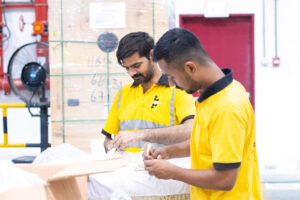
Certain enterprises are actively seeking to circumvent the Red Sea and opt for overland shipping routes across the Arabian Peninsula, prompted by security concerns arising from attacks by Yemen’s Houthi rebels.
- Why it’s significant
- Plans on establishing new routes
- Partner with TFI to Overcome the Red Sea Crisis
Trucknet Enterprise Ltd., an Israeli software startup, is presently transporting goods from ports in the United Arab Emirates (UAE) and Bahrain overland through Saudi Arabia and Jordan to Israel, extending onwards to Europe. According to Bloomberg, cargo from various Asian countries, including India and China, has already been redirected along this route in recent weeks.
In response to the escalating situation in the Red Sea, other companies are also considering alternatives. Reuters reported in December last year that Electrolux, a Swedish home appliance manufacturer, established a task force to explore alternative routes. Additionally, the French food company Danone indicated its intention to investigate different sea and road routes should the challenges in the Red Sea persist.
Bloomberg also reported that the German shipping giant Hapag-Lloyd is actively considering the establishment of a connection between Dubai and two ports on the western coast of Saudi Arabia, near the Red Sea. Additionally, they are exploring a route connecting Dubai to Jordan. It is worth noting that Jordanian officials had previously refuted any involvement in a land bridge with Israel, as reported by the state-run news outlet Petra in December. This denial came in response to reports in Israeli media suggesting the existence of such a route.
The Houthi rebels in Yemen have been targeting ships in the Red Sea since the onset of the Gaza war in October 2023. The rebels assert that their targets are associated with Israel, although many of the vessels targeted have no known connections to the country.
Why it’s significant
The ongoing Houthi attacks have significantly disrupted global shipping operations. Al-Monitor reported a notable decline in trade volume through the Suez Canal in January, while the International Monetary Fund revealed a nearly 30% reduction in shipping via the Red Sea since the beginning of the year, as reported by Agence France-Presse.
In response to the threats in the Red Sea, some major shipping companies have opted for more expensive and time-consuming routes around Africa to avoid the affected area. Danish shipping giant Maersk recently announced a temporary halt to all shipping activities through the sea.
While land-based shipping successfully evades Houthi attacks in the Red Sea, it comes with its own limitations. Hanan Fridman, CEO of Trucknet, highlighted to Bloomberg that trucks have significantly lower cargo capacity compared to ships, for instance.
Plans on establishing new routes
The exploration of alternative routes to bypass the Red Sea and the Suez Canal had been gaining traction even before the onset of the war. As of July, Al-Monitor confirmed that the construction of a land bridge between Israel and Saudi Arabia had already commenced.
In September, the UAE, India, the United States, Saudi Arabia, and several European states jointly announced the establishment of the new India-Middle East-Europe Corridor. This transit corridor is designed to rival China’s Belt and Road Initiative.
Meanwhile, Iran, Russia, and India have been collaboratively working on the development of the International North–South Transport Corridor for several years. The corridor encompasses shipping, rail, and road routes from India through Iran, extending to Russia and Europe, effectively circumventing the Suez Canal.
Partner with TFI to Overcome the Red Sea Crisis
Drawing on more than thirty years of operational expertise in navigating disruptions to global trade routes, TFI offers a flexible and reliable transportation solution through the UAE. Leveraging the Jebel Ali Port in Dubai as our primary hub for receiving shipments, we then facilitate cross-border transportation to the Gulf countries. Tailoring our approach to meet your specific timeline and budgetary needs, we deploy air, land, or rail freight to seamlessly transport the cargo to its ultimate destination.


